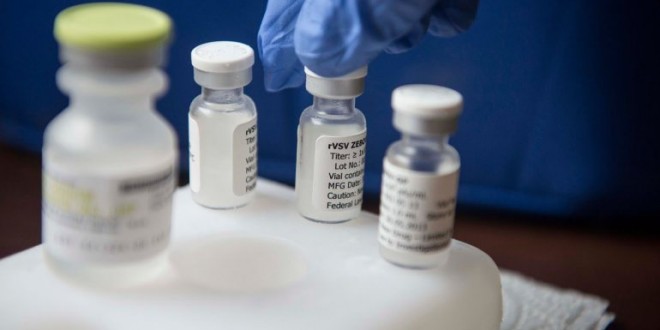Ebola vaccine? Early results from a trial in Guinea show that the drug protected 100 percent of the people who received it against Ebola. If the trial’s results continue to show this level of promise, the vaccine could help end the outbreak in West Africa.
“The initial results are exciting and very promising,” said Margaret Chan, director-general of the World Health Organization, in a press conference earlier today. “If proven effective, this is going to be a game changer, and it will change the management of the current Ebola outbreak and future outbreaks.”
About 27,000 people have been infected with Ebola since the beginning of the West African outbreak; 11,000 have died. There’s no cure for the virus right now, but infection can be avoided through routine hand-washing and by using gloves or other barriers that prevent contact with bodily fluids. Ebola doesn’t spread through the air, which means that only direct contact with the body fluids of a person who is showing symptoms of Ebola will spread the virus. Still, the current outbreak has been devastating, and the hunt for a vaccine continues. Now, it seems that scientists have a real contender on their hands.
In the Guinea trial, published today in The Lancet, 4,000 people with close ties to Ebola patients either received the vaccine immediately or three weeks after the identification of an Ebola patient in their social circle. Among the 2,014 people who received the drug immediately, no cases of Ebola were reported, starting 10 days after the initial vaccination, which is the time period needed to develop immunity. There were 16 cases of Ebola in the group that were given the vaccine three weeks later, however. “The results of this interim analysis indicate that rVSV-ZEBOV might be highly efficacious and safe in preventing Ebola virus disease,” the researchers write in the study.
An independent body of international experts reviewed the study’s results and decided that the trial should continue. Starting July 26th, all of the study’s participants were given the vaccine immediately, instead of putting half in a delayed group. In addition, the trial will now be open to teenagers aged 13 to 17; it’s possible that the trial will soon include children age 6 to 12 as well. These results don’t mean that the world now has an Ebola vaccine. The vaccine needs to undergo further safety and efficacy testing.
The vaccine is also being tested on frontline health workers, Bertrand Draguez, medical director at Doctors Without Borders, said in a statement. “These people have worked tirelessly and put their lives at risk every day to take care of sick people,” he said. “If the vaccine is effective, then we are already protecting them from the virus.”
Agencies/Canadajournal
 Canada Journal – News of the World Articles and videos to bring you the biggest Canadian news stories from across the country every day
Canada Journal – News of the World Articles and videos to bring you the biggest Canadian news stories from across the country every day



